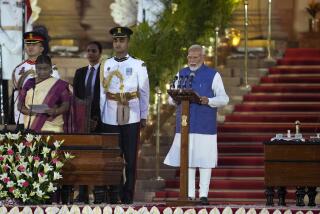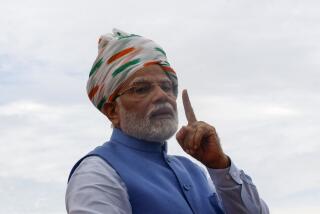1947
- Share via
‘Long years ago, we made a tryst with destiny, and now the time comes when we shall redeem our pledge. The achievement we celebrate today is but a step, an opening of opportunity, to the great triumphs and achievements that await us.’
Nehru was India’s first premier, from its founding until his death in 1964.
Some key dates:
Aug. 15, 1947: India, a British territory, gains independence.
Jan. 30, 1948: Independence leader Mohandas K. “Mahatma” Gandhi is assassinated by a Hindu fanatic.
Jan. 26, 1950: Constitution is adopted, creating the world’s largest democracy.
1966: Indira Gandhi, Nehru’s daughter, becomes prime minister.
October 1984: After increasing Hindu-Sikh tensions and an army attack on a Sikh temple, Indira Gandhi is assassinated by two Sikh bodyguards.
1991: Ex-Premier Rajiv Gandhi, Indira’s son, is assassinated.
1996: Government changes several times in rapid succession after Rao resigns amid corruption charges.
Aug. 15, 1997: Under leadership of new premier, Inder Kumar Gujral, India will celebrate 50 years of independence.
‘The Emergency’
Under attack over alleged vote fraud and facing opposition-led labor strikes, Prime Minister Indira Gandhi in June 1975 invoked emergency provisions of the Indian Constitution. For the next 18 months, thousands of opposition politicians were arrested, the press was placed under censorship, and measures to control prices and productivity were adopted. But the most controversial order was a program of forced sterilization aimed at combating India’s population problem. Tens of thousands of Indians--often from the lowest castes and religious minorities--were forcibly sterilized. Many government employees were not paid until they underwent sterilization. Resentment of the emergency restrictions led to the Congress Party’s first defeat, in 1977 parliamentary elections. Gandhi lost in her home constituency in Uttar Pradesh, but three years later she was reelected.
1997
‘I am ashamed. We talk to much about liberalization. But a Communist country like China can achieve so much while we can’t. This means something is wrong.’
Gowda was premier from June 1996 until April, when he resigned after a parliamentary vote of no confidence.
Sources: Columbia Encyclopedia, Political Handbook of the World 1997, Times staff reports
More to Read
Sign up for Essential California
The most important California stories and recommendations in your inbox every morning.
You may occasionally receive promotional content from the Los Angeles Times.










